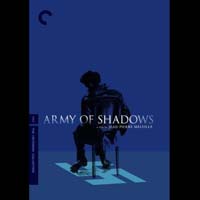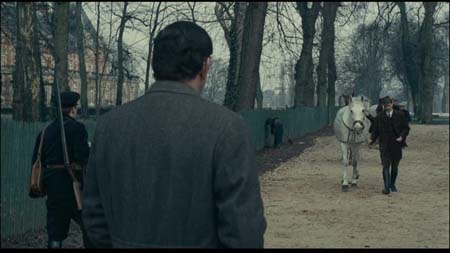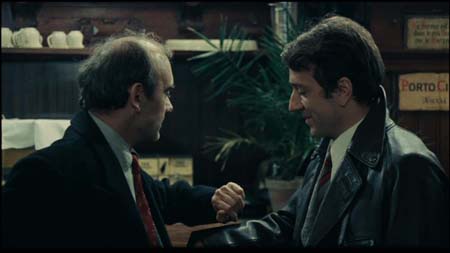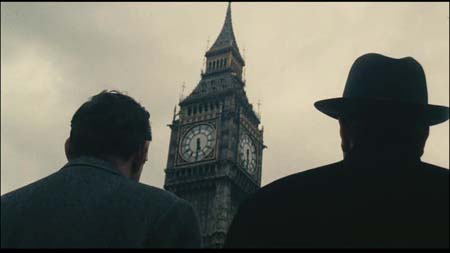 BUY IT AT AMAZON: CLICK HERE!
BUY IT AT AMAZON: CLICK HERE!
STUDIO: Criterion Collection
MSRP: $39.95
RATED: NR
RUNNING TIME: 145 Minutes
SPECIAL FEATURES:
• Audio Commentary by film historian Ginette Vincendeau
• New Interviews with cinematographer Lhomme and editor Francoise Bonnot
• Archival video excerpts, including on-set footage and interviews with Melville, cast members, writer Joseph Kessel, and real-life Resistance fighters
• Melville et "L’armée des Ombres,"a short program on the director and film
• Le Journal de la Resistance, a rare short documentary shot on the front lines of the final days of German-occupied France
• Restoration demonstration
• Booklet featuring critic Amy Taubin, historian Robert O. Paxton, and excerpts from Rui Nogueira’s Melville on Melville
The Pitch
“A thriller about the French Resistance? Man, who wouldn’t want to see that?”
The Humans
Lino Ventura, Paul Meurisse, Jean-Pierre Cassel, Simone Signoret
The Nutshell
German-occupied France, 1942. Philippe Gerbier commands a Resistance cell charged with disrupting Nazi activity on all fronts. But this isn’t a fun romp a la The Guns of Navarone or Mission Impossible: Death, or worse, faces Gerbier and his men at all times, and it’s more likely than not that the whole endeavor ends in tears.

"I think he knows, Copernicus."
The Lowdown
Jean-Pierre Melville may be the great underapprieciated God of French cinema. You think Godard heralded in the New Wave with Breathless in 1960? Wrong—Melville did it four years earlier with his classic Bob le Flambeur. You like John Woo? Or, for that matter, every single action movie ever influenced by Woo’s work? What about Michael Mann’s police procedurals/studies in moral ambiguity? Without Melville’s Le Samourai and Le Cercle Rouge, we’d still be playing analog in a digital world. Point is, Melville’s a director about which you should give a shit.
And Army of Shadows is his masterpiece. It’s a suspenseful, tense, unrelentingly grim film that’s exhilarating to watch; you better believe Steven Spielberg took a long, hard look at this one when crafting Munich ‘cause its influence is all over that one. How good is Army of Shadows? The New York Film Critics Circle awarded this bad-boy their “Best Foreign Film of 2006 Award,” that’s how good it is.
Yes, you read that right. 2006. French audiences despised this film when it was released in 1969, finding it a work of pro-government propaganda at a time when the French government was fucking things up left and right (yes, I realize that was the most colloquial and rushed description of a major event since “It rained a lot” was used to describe the Flood of Noah). Melville was so hurt the film went unseen until now. I don’t automatically hate the French, but man, did they blow it in ’69. This is a brilliant flick, one completely deserving of praise.

"Much as I’d love to stand here all day and let you rub my midsection, I’ve things to do and people to annoy."
And it wouldn’t be if Melville made a propaganda film. Melville was a seasoned Resistance fighter, he knew how closely life and death were intertwined in it, and he sure as hell wouldn’t cheapen his own experiences by turning them into simple escapist pablum. In no way are Gerbier and his men romanticized; we’re supposed to respect their achievements and admire their skill, yes, but in a natural way—these people risked certain death day in and day out for a (at the time) losing cause. If that doesn’t warrant props, I don’t know what does.
This is even harder to do in a world as morally ambiguous as the one in the film. Gerbier is a brave, heroic man, but he and his men are also capable of shocking violence, justified or otherwise. There is a revenge killing in this film that is as disturbing as any I’ve ever seen (and again, I’ll eat my hat if Spielberg wasn’t paying homage to it in Munich). Not only does it illustrate the old Hitchcock bit of how difficult it actually is to kill a man, but the matter of fact way the murder is discussed, performed, and ultimately accepted by all parties involved. By keeping the tone grim as bone, Melville also undercuts any cheap thrills. Death, or torture, can come at any time for the Resistance fighters, for little to no reason. One of the most wrenching scenes shows a compatriot of Gerbier realize, fatally late, that he’s been trailed by the Germans, a moment Melville emphasizes brilliantly by connecting the loss of the man’s hat to the loss of his life.
More than anything, I’m struck by how much of a piece this film is. Melville was also a master of controlled tone throughout his oeuvre. Take Le Samourai and Le Cercle Rouge. Melville strips his characters down to their barest essentials; they’re stony, impassive archetypes who commit murder and robbery, respectively, and freely suffer the consequences that follow because that’s their function on this planet, what they’re designed to do. Visually and thematically, it’s fascinating to watch this existential take on otherwise standard crime tales, but I can see how many viewers could find that off-putting and weird. Here, form meets content. The Resistance fighters are cold and impassive because any slip-up in the façade, any unplanned emotion or unregulated impulse, can and will result in certain death. More than just being an amazingly tense flick, this is Melville’s most easily accessible one as well.

Worst. Herpes. Outbreak. Ever.
I could go on and on about this one, from the amazing opening shot, to the subtle humanity with which Lino Ventura imbues Gerbier, to the uncompromising finale. But I’m gonna shut up now. Best you see for yourself. You know when someone says something is fucking brilliant in that incontestable way that means you should see it?
Well, Army of Shadows is fucking brilliant, and you should see it.
The Package
The flick looks remarkable, given its age and neglect (more on that later). The print is muted yet sharp, and probably looks better now than it did in ’69. Audio-wise, you got the original mono sound and a new Dolby 2.0 track, which sounds pretty sound—it’s slightly fuller in sound. Since this is a Criterion disc, the box art rocks. It’s a silhouette of one of the main characters in his torture chair, sitting on a swastika.
Also, since this is a Criterion disc, it’s absolutely fucking stacked with special features. We’ll start from the outside and move our way in.
There’s a forty-three page booklet included with some terrific articles, the Amy Taubin and the Noguiera interview being the standouts. All are spoiler-heavy, so I’d suggest reading them after watching the film. On Disc 1, you get two trailers, including the much better 2006 restoration one, and a great audio commentary by film historian and Melville biographer Ginette Vincendeau. This track is hella informative, covering the significance and symbolism behind the style of the film, influences on Melville, and the personal connections to his life spread throughout. If you loved this flick, this track is absolutely essential.
Disc 2 is all supplemental footage. We start out with the interview excerpts. The first, a vintage on-set talk with Melville, isn’t all that informative, but it’s amusing still seeing as how it’s basically an early EPK short. Francoise Bonnot, the daughter of Melville’s editor on the film, also gets an interesting interview, where she warmly recollects her mother’s relationship with the man. After that, there’s the restoration demonstration. Far from a simple “before and after” piece, this feature, which focuses on Lhomme, runs about 15 minutes and covers all the bases, from working on-set with Melville, to painstakingly restoring the opening shot, to retouching the color palette for the restoration. Lhomme says that the work done for the restoration last year is closer to Melville’s original intentions than the initial film prints in 1969 were. Good job. It only took thirty-seven years, but really, who’s counting?
We then move into the segments from L’invité du dimanche, a French talk-show. These are all vintage, and they cover the gamut in terms of both information and participants. You got Melville, Signoret, Joseph Kessel (the author of the novel that inspired the film), and, most importantly, Andre Dewavrin, the real-life Resistance liaison between England and France during the war. This is fascinating stuff, and minus a few notable omissions (like Ventura, who did not get along with Melville at all), it’s pretty comprehensive.
A slight change of pace, the Melville et "L’armée des Ombres" documentary is actually pretty amusing. It’s a look back on Melville’s life by guys like Jean-Pierre Cassel and Bertrand Tavernier, but it’s quite irreverent and cheeky—certainly not your standard “he’s dead, let’s fellate him” profile piece.
Finally, there’s a section called “The Resistance.” You got three final extras here. The first, Le journal de la Résistance, is a 1944 propaganda documentary narrated by Noel Coward (!) that’s a front-line look at the last days of the German Occupation. Any trite propagandist tendencies are squelched by the stark, gritty, and sometimes grisly footage captured. After that comes a short piece, "Simone Signoret and Lucie Aubrac," a montage of interviews taken in 1984 of Signoret and Aubrac, the Resistance fighter Signoret based her character on (and knew personally previous to the film, as well). This section closes with an excerpt from a 1973 show called Ouvrez les Guillemets, which gathers interviews with surviving Resistance members to discuss their roles in the war and how the organization as a whole functioned.
Whew. I’m fucking exhausted now.

Insert generic cock joke here.
As a Jean-Pierre Melville superfreak, I loved this film, but I also think it’s his most easily accessible and involving one to boot. It’s just a great movie, a masterpiece even, and you owe it to yourself to check it out. The price is a bit steep, but it’s Criterion, so it looks great, sounds good, and is stocked with meaty extras. It’s worth the green.
And remember: just because the French didn’t watch this film doesn’t mean you don’t have to either. The French also eat horses, so…